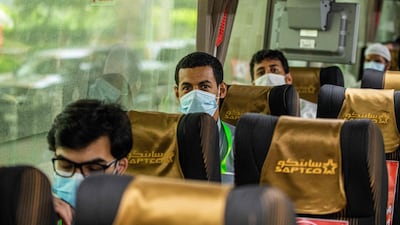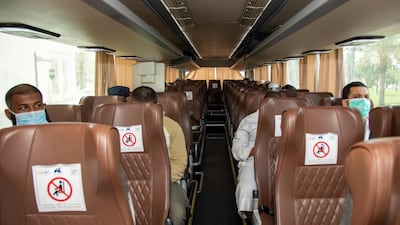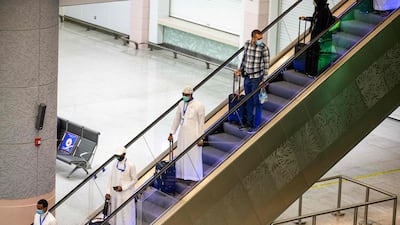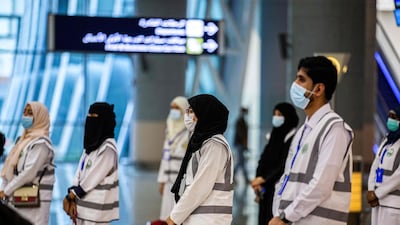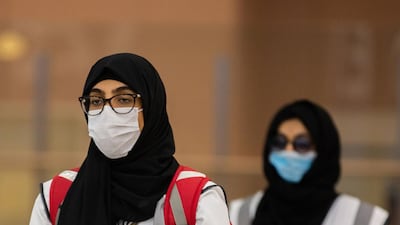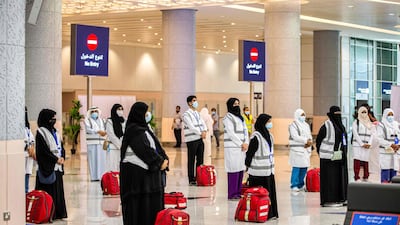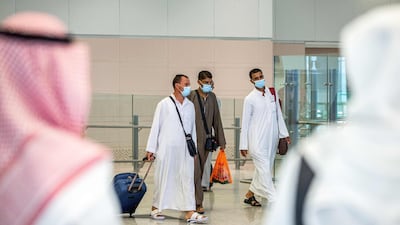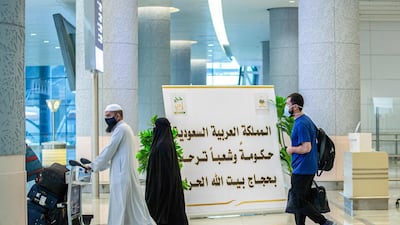Pilgrims have begun arriving Makkah for the Hajj pilgrimage that will have limited attendance this year because of the coronavirus pandemic.
The first group to arrive was flown in from Qassim province to Jeddah's King Abdulaziz International Airport on Friday before being transferred to a hotel in Makkah. They were followed by more arrivals from Madinah, Riyadh, Abha, Tabuk and Jizan on Saturday.
As part of strict health precautions surrounding the pilgrimage this year, the faithful who have been allowed to participate will have to quarantine at their hotels until it begins in the coming week. They will also have to undergo a quarantine after the pilgrimage.
The Undersecretary for Hajj Affairs, Hussain Al Sharif, said the procedures to receive the pilgrims were going smoothly. “As soon as they arrived, they were directed from the officials of the Ministry of Hajj and Umrah to the buses designated for them, while applying the approved health preventive protocols approved in the process of transportation,” he said.
Only about 1,000 pilgrims are being allowed to take part in Hajj this year, compared to 2.5 million last year. Participation has been limited to residents of the kingdom, with a special quota for those who have been on the frontline against the coronavirus outbreak. Around 70 per cent of attendees are foreign nationals residing in the kingdom and 30 per cent are locals.
Saudi Arabia on Saturday reported 2,201 new cases detected in the previous 24 hours, taking its total to 264,973. The kingdom's death toll from Covid-19 rose by 31 to 2,703, while recoveries rose by 2,051 to 217,782, the Saudi health ministry said.
Officials said anyone trying to attend Hajj without a permit would face hefty fines and even jail time. The security services have erected a cordon around the main Hajj sites to ensure the safety of attendees. Those who are found to be transporting non-permit holders to the sites of Hajj will also be fined.
“Hajj this year is very different and exceptional,” Major-General Zayed Al-Tuyan, commander of Hajj Security, said. “Hajj will be in very limited numbers under strict precautionary measures, and we will impose a complete security cordon around holy places and pilgrims during their movements.”
Authorities said pilgrims will be provided with bottled holy water from Mecca's Zamzam well and sterilised pebbles for the ritual of stoning the devil.
Olivier Barles, Regional Medical Director at International SOS in Dubai, said pilgrims would still have to watch out for heatstroke, dehydration, food poisoning and exhaustion while undertaking Hajj as they would every year.
Even in a regular year, the Hajj leaves pilgrims exposed to a host of viral illnesses.
"A lot of people want to do the Hajj this year as it will likely be less burdensome and more organised due to a smaller crowd," Umar Karim, a visiting fellow at the Royal United Services Institute in London, told AFP.
“In the context of Covid-19, pilgrims are advised to keep a safe distance between each other, to wear face masks and gloves and maintain a high degree of personal hygiene by washing hands frequently,” Mr Barles said.
